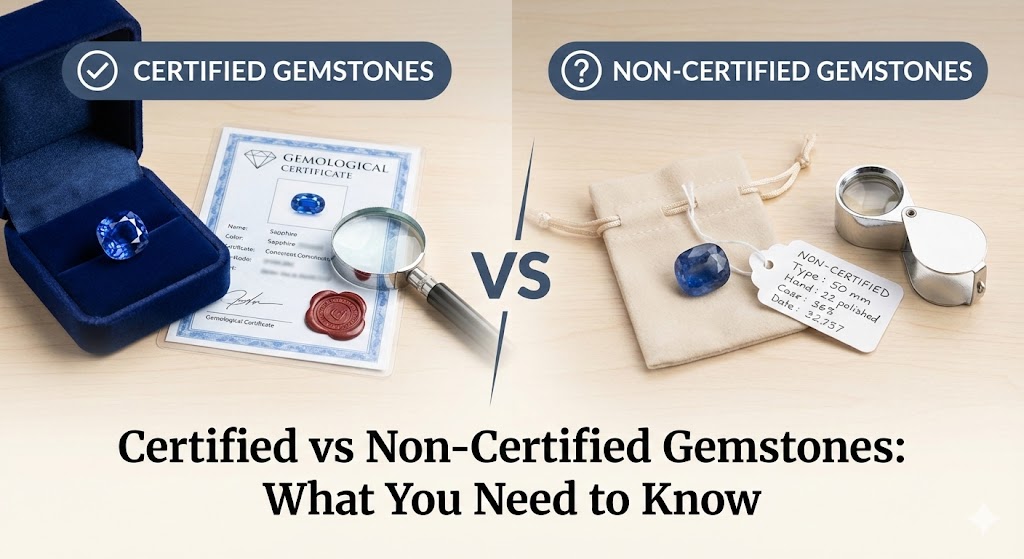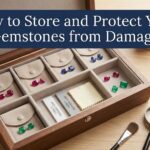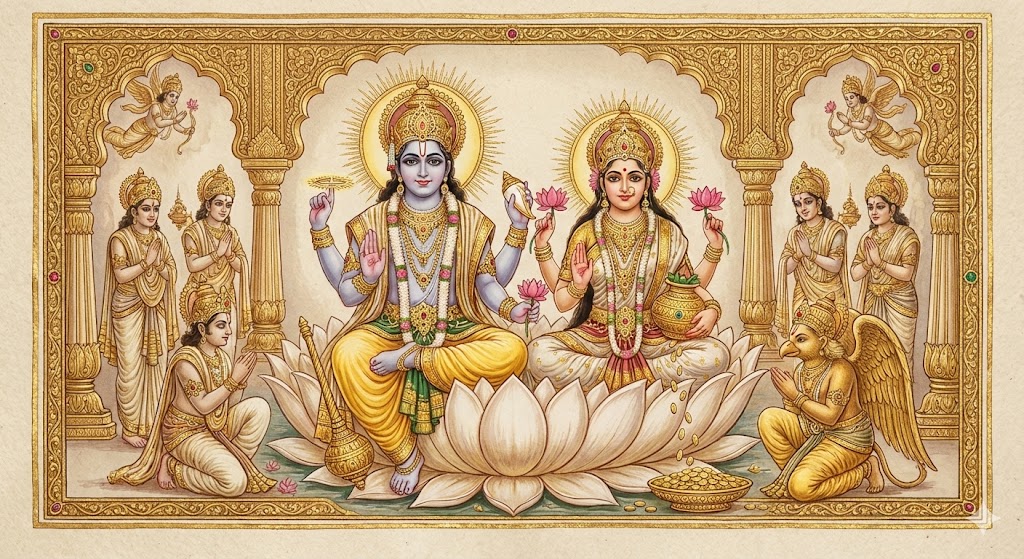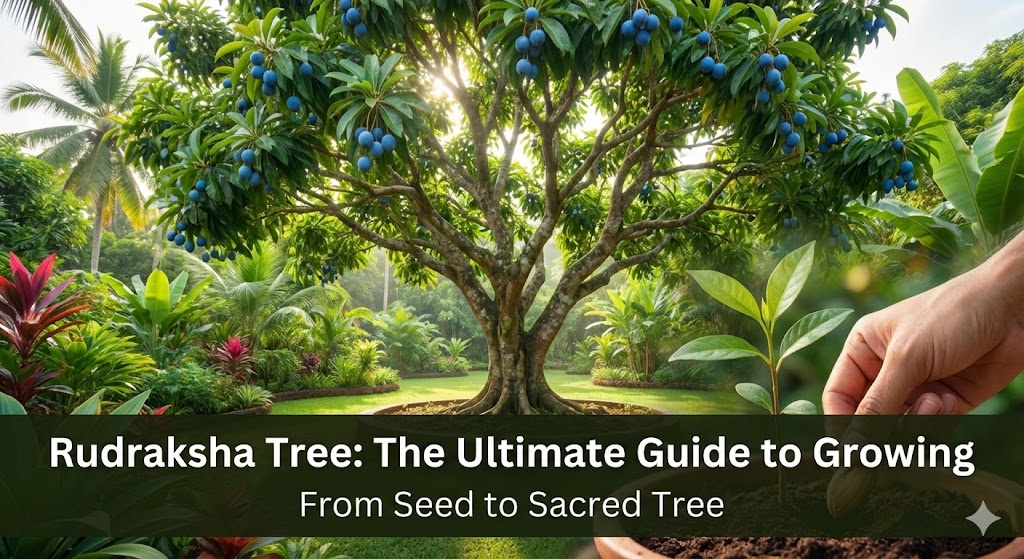Certified vs Non-Certified Gemstones: Buying a gemstone is an exciting experience, whether you’re shopping for an engagement ring, a precious collector’s piece, or a meaningful gift. But there’s one question that often leaves buyers confused: Should I buy a certified gemstone or is a non-certified one just as good?
The difference between certified and non-certified gemstones goes far beyond a piece of paper. It affects the stone’s value, your confidence in the purchase, and even its resale potential years down the line. Unfortunately, many buyers learn this lesson the hard way—after spending thousands on a stone that turns out to be something entirely different from what they were promised.
In this comprehensive guide, you’ll learn exactly what gemstone certification means, how certified and non-certified stones compare, which gemological laboratories to trust, and how to make a purchase decision that protects both your investment and your peace of mind. By the end, you’ll have the knowledge to shop for gemstones like an expert.
What Does Gemstone Certification Mean?
Gemstone certification is the process of having an independent, qualified gemological laboratory examine and document a stone’s characteristics. The resulting certificate—often called a gem lab report—serves as an official record of the gemstone’s identity, quality, and features.
Think of it like a detailed medical report for your gemstone. Just as a doctor examines your health and documents findings, a certified gemologist uses specialized equipment and expertise to analyze every aspect of a stone. This includes its species, variety, weight, dimensions, color, clarity, cut quality, and any treatments it may have undergone.
The certificate doesn’t assign a monetary value to the stone. Instead, it provides objective information that buyers, sellers, and insurers can use to understand exactly what the gemstone is. This transparency is what makes certified gemstones fundamentally different from their non-certified counterparts.
Key Information Found on a Gemstone Certificate
A proper gemstone certificate from a reputable laboratory typically includes the following details:
- Gemstone identification (species and variety, such as “natural ruby” or “blue sapphire”)
- Carat weight measured to the hundredth decimal
- Dimensions in millimeters (length, width, depth)
- Shape and cut style (oval, round brilliant, cushion, etc.)
- Color grade including hue, tone, and saturation
- Clarity characteristics and any visible inclusions
- Treatment disclosure (heated, filled, untreated, etc.)
- Origin determination when possible (optional service at some labs)
- Unique identification number linked to the lab’s database
Understanding Non-Certified Gemstones
A non-certified gemstone is simply a stone that has not been examined and documented by an independent gemological laboratory. This doesn’t automatically mean the gemstone is fake, low-quality, or treated—it just means there’s no third-party verification of its characteristics.
Many legitimate gemstones are sold without certification. Small accent stones in jewelry, lower-value gems, and stones sold through informal channels often skip the certification process because the cost of obtaining a certificate may exceed the value of the stone itself.
However, the absence of certification also means you’re relying entirely on the seller’s claims. Without independent verification, there’s no way to confirm that the gemstone is natural rather than synthetic, untreated rather than heat-treated, or even the species the seller claims it to be.
Common Reasons Gemstones Remain Non-Certified
Several factors explain why a gemstone might be sold without certification:
- Cost considerations: Lab fees can range from $50 to several hundred dollars, making certification impractical for lower-value stones
- Time constraints: Obtaining certification can take days to weeks, which some sellers wish to avoid
- Lack of awareness: Some smaller dealers or private sellers simply don’t prioritize certification
- Intentional omission: In some cases, sellers avoid certification to hide treatments, quality issues, or misrepresentation
Certified vs Non-Certified Gemstones: Side-by-Side Comparison
Understanding the practical differences between these two categories helps clarify why certification matters for significant purchases.
| Factor | Certified Gemstones | Non-Certified Gemstones |
|---|---|---|
| Authenticity verification | Confirmed by independent lab | Based on seller’s word only |
| Treatment disclosure | Fully documented | May be unknown or undisclosed |
| Quality grading | Objective, standardized assessment | Subjective seller assessment |
| Resale value | Easier to sell, higher buyer confidence | Harder to sell, requires new certification |
| Insurance purposes | Accepted by insurers | May require certification first |
| Price transparency | Justified by documented quality | Harder to verify fair pricing |
| Buyer protection | Lab records serve as documentation | Limited recourse if issues arise |
| Investment potential | Strong for high-quality certified stones | Speculative without verification |
Why Gemstone Certification Matters: 5 Key Benefits
1. Proof of Authenticity and Natural Origin
The most fundamental benefit of certification is knowing exactly what you’re buying. A certified gemstone has been tested using advanced equipment like spectrometers, refractometers, and microscopes to confirm its identity. The certificate tells you whether the stone is a natural ruby versus a synthetic one, whether your “sapphire” is actually a less valuable spinel, or whether your emerald is natural or created in a laboratory.
This matters enormously because synthetic and imitation gems can be virtually indistinguishable from natural stones to the naked eye. Even experienced jewelers can be fooled without proper testing equipment.
2. Full Disclosure of Treatments
Gemstone treatments are common industry practices that can dramatically affect a stone’s value. Heat treatment to improve color, fracture filling to hide cracks, diffusion to add color, and irradiation to change appearance are all widely used. While many treatments are accepted and stable, others are temporary or significantly reduce a stone’s value.
A certified gemstone comes with complete treatment disclosure. This allows you to make an informed decision about what you’re willing to accept and ensures you’re paying an appropriate price for the stone’s actual condition.
3. Objective Quality Assessment
Without certification, you’re relying on the seller’s subjective opinion of quality—and sellers have obvious incentives to present their stones in the best possible light. A gemological laboratory provides an unbiased, professional evaluation based on established standards.
This objective assessment is particularly valuable when comparing stones from different sellers or when you lack the expertise to evaluate quality yourself.
4. Protection for Insurance and Appraisal
If you need to insure a valuable gemstone, insurance companies typically require documentation of the stone’s characteristics. A gemstone certificate from a respected laboratory satisfies this requirement and ensures you can obtain appropriate coverage. In the event of loss or damage, the certificate also simplifies the claims process.
5. Enhanced Resale Value
Certified gemstones are significantly easier to sell than non-certified ones. Future buyers have confidence in what they’re purchasing, and they don’t need to factor in the cost and uncertainty of obtaining their own certification. For high-value stones, certification can make the difference between a successful sale and an unsellable gem.
Top Gemological Laboratories You Can Trust
Not all gemstone certificates carry equal weight. The reputation, expertise, and consistency of the certifying laboratory directly impact how much trust you can place in their assessments. Here are the most respected gemological laboratories worldwide.
GIA (Gemological Institute of America)
The GIA is widely considered the gold standard in gemological certification. Founded in 1931, this nonprofit organization developed many of the grading standards used throughout the industry today, including the famous 4Cs for diamond grading. GIA certificates are recognized and trusted worldwide, making them ideal for high-value purchases and investment-grade stones.
Gübelin Gem Lab
Based in Switzerland, Gübelin has been certifying gemstones since 1923 and is particularly renowned for colored stone expertise. Their reports are highly respected in the international market, especially for determining gemstone origin—a factor that can significantly impact value for stones like Kashmir sapphires or Burmese rubies.
SSEF (Swiss Gemmological Institute)
Another Swiss institution, SSEF is recognized globally for its scientific approach and expertise in colored gemstones. The laboratory is especially trusted for high-value colored stones and origin determination.
AGL (American Gemological Laboratories)
AGL has built a strong reputation in the United States for colored gemstone certification. Their detailed reports include comprehensive treatment information and are widely accepted by dealers and auction houses.
IGI (International Gemological Institute)
With laboratories worldwide, IGI offers accessible certification services and is commonly used for commercial jewelry. While perhaps not carrying the same prestige as GIA or Gübelin for top-tier stones, IGI reports are reliable and widely recognized.
Other Reputable Laboratories
Additional trusted laboratories include Lotus Gemology (Bangkok), GRS (Gem Research Swisslab), and the German Gemmological Association (DSEF). Regional labs like GIT (Thailand) and AIGS (Asian Institute of Gemological Sciences) also maintain good reputations for colored stones.
When Should You Buy Certified Gemstones?
While certification isn’t necessary for every gemstone purchase, certain situations make it essential.
High-Value Purchases
For any gemstone purchase exceeding a few hundred dollars, certification provides protection proportional to your investment. The higher the value, the more important independent verification becomes.
Engagement Rings and Heirloom Pieces
Jewelry with emotional significance deserves the assurance that comes with certification. These pieces are meant to last generations, and proper documentation ensures their value and authenticity are preserved.
Investment Purposes
If you’re buying gemstones partly as an investment or store of value, certification is non-negotiable. Uncertified stones are extremely difficult to value accurately and even harder to sell at fair market prices.
Online Purchases
When you can’t examine a stone in person, certification becomes your primary protection against misrepresentation. Reputable online sellers of significant gemstones will always offer properly certified stones.
Rare or Origin-Specific Stones
Certain origins command premium prices—Burmese rubies, Kashmir sapphires, Colombian emeralds, and Paraíba tourmalines, for example. If you’re paying extra for origin, you need a certificate from a laboratory qualified to make that determination.
When Might Non-Certified Gemstones Be Acceptable?
Certification isn’t always practical or necessary. Here are situations where non-certified gemstones may be reasonable purchases:
Small Accent Stones
The tiny gemstones used as accent stones in jewelry are rarely certified individually. The cost of certification would exceed the stone’s value, and the practical impact of minor quality variations is negligible.
Low-Value Purchases
For inexpensive gemstones purchased purely for aesthetic enjoyment rather than investment, the cost of certification may not make sense. A $30 amethyst doesn’t need a $100 lab report.
Established Relationships
If you’ve built a long-term relationship with a trusted jeweler and have verified their honesty through previous purchases, you may feel comfortable buying certain items without certification. However, this should only apply to lower-value pieces.
Clearly Labeled Synthetic or Treated Stones
If you’re knowingly purchasing a synthetic or heavily treated gemstone at an appropriate price, certification may be unnecessary since there’s no deception involved.
How to Verify a Gemstone Certificate Is Authentic
Unfortunately, fake certificates exist alongside fake gemstones. Here’s how to verify that a certificate is legitimate:
Check the Laboratory’s Database
Most reputable laboratories maintain online databases where you can verify a certificate using its unique report number. GIA, for example, offers Report Check on their website where you can confirm that a certificate is genuine and view the associated details.
Examine Security Features
Authentic certificates from major laboratories include security features like holograms, watermarks, QR codes, and microprinting. Familiarize yourself with these features for the specific laboratory.
Compare to Known Authentic Certificates
If you’ve seen legitimate certificates from a laboratory before, compare the suspicious certificate carefully. Formatting, fonts, paper quality, and terminology should all be consistent.
Contact the Laboratory Directly
When in doubt, contact the laboratory directly using contact information from their official website—not from the certificate itself, which could be fraudulent. Provide the report number and stone details for verification.
Be Wary of Unknown Laboratories
Certificates from unknown or obscure laboratories should be treated with skepticism. Some sellers create their own “laboratory” specifically to issue certificates for stones they’re selling—an obvious conflict of interest.
Common Gemstone Buying Mistakes to Avoid
Learning from others’ mistakes can save you significant money and disappointment.
Trusting Seller-Provided “Certificates”
Some sellers provide in-house documentation that looks like a certificate but lacks independent verification. These are essentially fancy receipts, not genuine gemological reports.
Assuming All Laboratories Are Equal
The quality and reliability of gemological laboratories vary enormously. A certificate from an unknown lab may be worth less than no certificate at all if it creates false confidence.
Ignoring Treatment Disclosures
Even with a certificate, you must read and understand the treatment information. A “natural ruby” that has been heavily treated is worth far less than an untreated stone of similar appearance.
Paying Origin Premiums Without Proper Documentation
If you’re paying a premium for a specific origin, ensure the laboratory is qualified to make that determination and that the origin is stated with appropriate confidence on the certificate.
Assuming Price Equals Quality
High prices don’t guarantee quality or authenticity. Some sellers simply charge more for the same stones. Certification provides objective data to evaluate whether a price is justified.
The Cost of Gemstone Certification
Understanding certification costs helps you make informed decisions about when it’s worthwhile.
Fees vary significantly based on the laboratory, stone type, and services requested. Basic identification reports start around $50-100 at many laboratories. Comprehensive reports with origin determination can cost several hundred dollars. Rush services and additional testing add to the fees.
For comparison, GIA gemstone identification reports typically range from about $80 to $200 depending on the services included. Origin reports and other premium services increase costs further.
While these fees may seem significant, they’re modest compared to the potential cost of buying a misrepresented stone. For a gemstone worth thousands of dollars, spending a few hundred on proper certification is excellent insurance.
Red Flags When Shopping for Gemstones
Certain warning signs should make you proceed with extra caution or walk away entirely:
- Pressure to decide immediately without time for independent verification
- Certificates from unknown laboratories or laboratories that can’t be verified online
- Reluctance to allow independent inspection or certification before purchase
- Prices significantly below market for the claimed quality
- Vague or evasive answers about treatments or origin
- Claims that certification is unnecessary for expensive stones
- Certificates with details that don’t match the stone exactly
- Sellers who can’t explain the certificate’s terminology or grading
How to Request Certification for Gemstones You Already Own
If you have gemstones without certification and want to obtain proper documentation, the process is straightforward:
First, select a reputable laboratory appropriate for your stone type and value. For diamonds and high-value colored stones, GIA or other top-tier labs are recommended. For commercial-grade colored stones, regional laboratories may be sufficient and more cost-effective.
Contact the laboratory to understand their submission requirements, fees, and turnaround times. Most labs offer different service levels at different price points.
Pack the stone securely according to the laboratory’s guidelines and ship via insured, tracked service. Include any information you have about the stone’s history or claimed characteristics.
After examination, you’ll receive the certificate along with your stone. The laboratory maintains records of the examination that can be verified in the future.
Certified vs Non-Certified Gemstones: Making Your Decision
The question of whether to buy certified or non-certified ultimately depends on your specific situation, but some general principles apply.
Choose certified when: you’re spending significant money, buying online, purchasing for investment, need insurance documentation, or want the stone to hold resale value.
Non-certified may be acceptable when: you’re buying low-value stones, purchasing accent stones, or working with an extremely trusted seller on modest purchases.
When in doubt, the small additional cost of certification provides peace of mind and protection that’s almost always worthwhile for any meaningful purchase.
Conclusion
The difference between certified and non-certified gemstones comes down to verified information versus trust. Certification doesn’t change the gemstone itself, but it transforms an uncertain purchase into an informed decision.
For significant gemstone purchases, the benefits of certification—authenticity verification, treatment disclosure, objective quality assessment, insurance documentation, and resale protection—far outweigh the modest cost. The peace of mind alone is often worth the investment.
As you shop for gemstones, prioritize sellers who offer properly certified stones from recognized laboratories. Ask questions, verify certificates, and don’t let pressure or emotion override careful decision-making. Your future self will thank you for buying a gemstone you can trust completely.
Ready to start your gemstone journey? Look for reputable dealers who routinely work with recognized laboratories and are transparent about their certification practices. A trustworthy seller will welcome your questions and support your desire for proper documentation.
Understanding Gemstone Treatments and Their Impact on Certification
One of the most critical aspects of gemstone certification is treatment disclosure. Understanding common treatments helps you interpret certificate information and make informed purchasing decisions.
Heat Treatment
Heat treatment is the most common gemstone enhancement, used to improve color and clarity in rubies, sapphires, tanzanite, aquamarine, and many other stones. During this process, gemstones are heated to extremely high temperatures, sometimes exceeding 1800°C, to alter their appearance.
Most gemological laboratories classify heat treatment into categories. Simple heating with no residues is widely accepted in the market and has minimal impact on value for many stone types. However, heating with flux or other additives that leave residues is considered more significant and typically reduces value more substantially.
Certificates will clearly state whether heat treatment was detected, often using terminology like “evidence of heat treatment” or “no indication of heating.” For valuable purchases, understanding these distinctions matters enormously.
Fracture Filling and Clarity Enhancement
Some gemstones, particularly emeralds, commonly undergo clarity enhancement treatments. Oils, resins, or glass-like substances are used to fill surface-reaching fractures, making them less visible and improving the stone’s apparent clarity.
For emeralds, some degree of oil treatment is so common that the industry accepts it as standard practice. Certificates typically grade the extent of treatment as none, minor, moderate, or significant. Stones with no treatment or minor treatment command substantial premiums over heavily treated examples.
Ruby and sapphire can also undergo glass filling, which is a much more invasive treatment. Lead-glass filled rubies, sometimes called “composite rubies,” contain so much foreign material that many experts don’t consider them natural stones at all. Proper certification identifies these treatments clearly.
Diffusion Treatment
Diffusion involves heating a gemstone in the presence of certain chemicals that penetrate the stone’s surface to add or change color. Surface diffusion creates a thin color layer that can be removed by recutting, while lattice diffusion (particularly beryllium diffusion in sapphires) penetrates more deeply.
These treatments are considered significant because they introduce foreign material to create color that wasn’t naturally present. Certified stones will disclose diffusion treatment, which substantially affects market value.
Irradiation
Some gemstones are irradiated to alter their color. Blue topaz, for example, is almost always irradiated from colorless rough. Certain fancy-colored diamonds also undergo irradiation treatment.
While irradiation is stable and generally accepted for some gem types, it should always be disclosed. Certification ensures you know whether you’re buying a naturally colored stone or one that achieved its color through radiation exposure.
Coating and Surface Treatments
Surface coatings can temporarily improve a gemstone’s color or add effects like iridescence. These treatments are generally not considered acceptable for valuable stones because they’re not permanent and can wear off with normal use.
Reputable laboratories detect and disclose surface coatings. Finding such treatments on a certificate should raise serious concerns about the stone’s actual quality and the seller’s transparency.
Gemstone Certification for Specific Stone Types
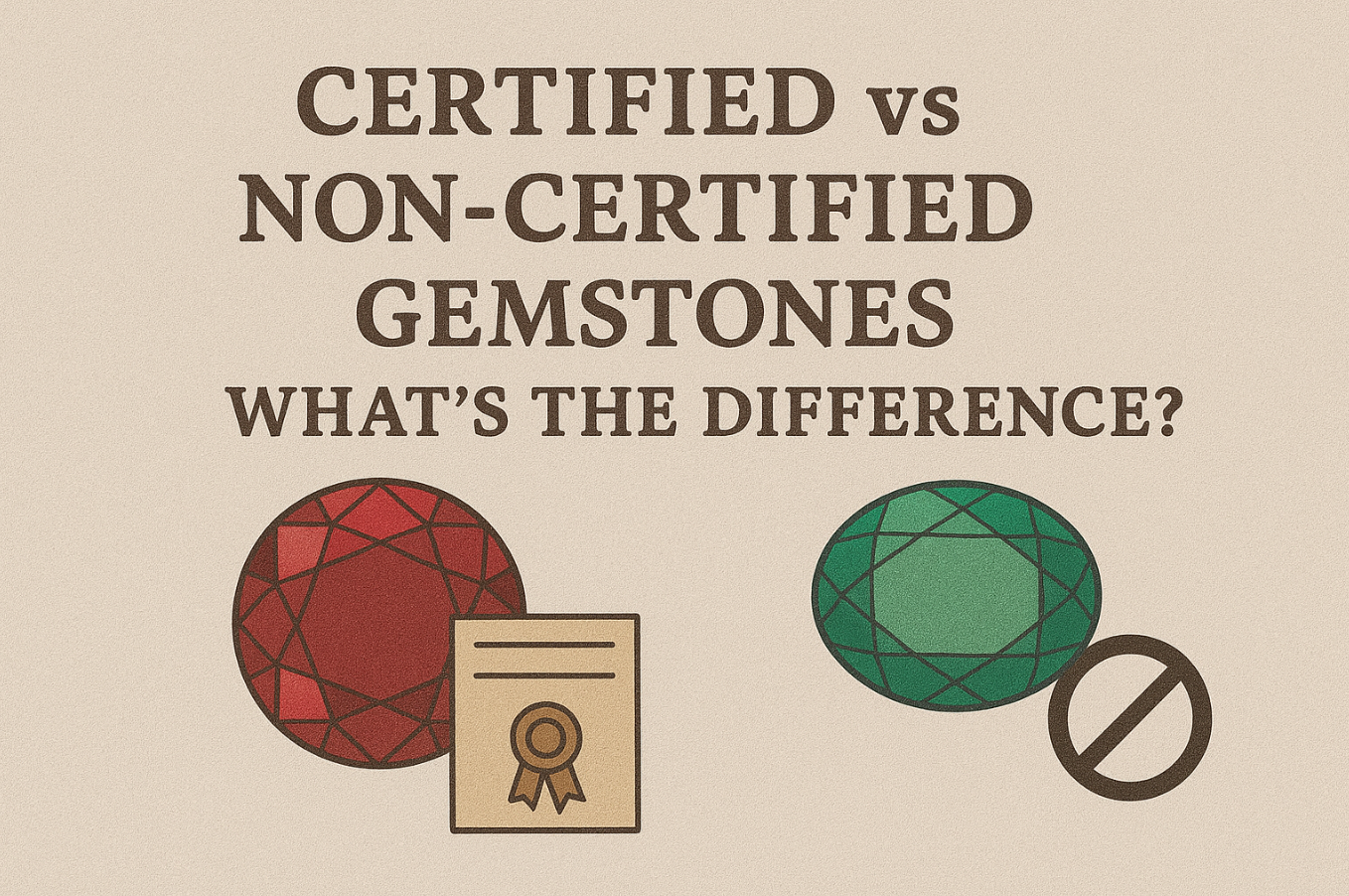
Different gemstone varieties have unique considerations when it comes to certification. Understanding these nuances helps you prioritize certification appropriately.
Diamond Certification
Diamonds have the most standardized certification system in the gem world, largely thanks to GIA’s development of the 4Cs grading system. Diamond certificates typically include detailed assessments of cut, color, clarity, and carat weight, along with fluorescence, polish, and symmetry grades.
For diamonds, even small differences in grade can mean thousands of dollars in value. A one-grade difference in color or clarity significantly impacts price. This makes certification essential for any diamond purchase beyond very small accent stones.
The diamond market also faces challenges from lab-grown diamonds that are chemically and physically identical to natural stones. Advanced testing at gemological laboratories can distinguish natural from lab-grown diamonds—a distinction that dramatically affects value and that’s impossible to make without proper equipment.
Ruby and Sapphire Certification
Corundum gems (ruby and sapphire) present complex certification considerations. Origin can dramatically affect value—a Burmese ruby may be worth many times more than a similar-looking Thai ruby. Heat treatment is extremely common and must be disclosed. And the line between ruby and pink sapphire is somewhat subjective.
For valuable rubies and sapphires, certification from laboratories with strong colored stone expertise is essential. Origin determination, when possible, adds significant value to certificates for premium stones.
Emerald Certification
Emeralds present unique challenges because they’re almost always included (have internal characteristics) and treatment is nearly universal. Understanding the type and extent of clarity enhancement is crucial for accurate valuation.
Colombian emeralds, particularly from the Muzo mine, command significant premiums, making origin certification valuable for high-quality stones. Laboratories with expertise in emerald evaluation can distinguish Colombian, Zambian, Brazilian, and other origins.
Colored Stone Certification Generally
For other colored stones—tanzanite, tourmaline, spinel, garnet, and dozens of others—certification priorities vary with value. Rare colors, exceptional sizes, and fine quality justify certification costs. More common or commercial-quality stones may not warrant the expense.
For investment-grade colored stones or pieces with significant value, always obtain certification from a laboratory with relevant expertise.
The Future of Gemstone Certification
The gemstone certification industry continues to evolve with technology and market demands. Understanding emerging trends helps you make forward-looking purchasing decisions.
Advanced Detection Technologies
Laboratories continually improve their ability to detect treatments and synthetic stones. Techniques that were undetectable years ago are now routinely identified. This ongoing advancement means that older certificates may not reflect treatments that would be detected today.
For vintage or estate pieces, consider obtaining updated certification from a modern laboratory. What was once sold as “natural” may prove to have treatments detectable with current technology.
Blockchain and Digital Certificates
Some industry participants are exploring blockchain technology to create tamper-proof digital records for gemstones. These systems aim to track stones from mine to market, creating transparent supply chains and permanent ownership records.
While still emerging, digital certification and provenance tracking may become increasingly important, particularly for high-value stones and consumers concerned about ethical sourcing.
Origin and Ethical Sourcing Documentation
Consumer interest in ethical sourcing continues to grow. Some laboratories and certification programs now offer documentation of a gemstone’s supply chain, confirming it was mined and processed under acceptable conditions.
This “mine to market” tracking adds another dimension to certification—not just what the stone is, but where it came from and whether its production met ethical standards.
Standardization Efforts
The colored stone industry lacks the standardization that diamonds enjoy. Various organizations work toward greater consistency in grading terminology and standards. As these efforts progress, certificates may become more comparable across laboratories.
How to Read and Interpret a Gemstone Certificate
Understanding certificate terminology helps you extract maximum value from this documentation.
Identification Section
This section confirms what the stone is—its species (like corundum) and variety (like ruby). For colored stones, color descriptions may include technical terminology describing hue, tone, and saturation.
Look for clear statements about whether the stone is natural, synthetic, or of undetermined origin. Any ambiguity in identification language should prompt questions.
Measurements and Weight
Dimensions are stated in millimeters, typically length × width × depth. Carat weight is recorded to at least two decimal places. These objective measurements should match the physical stone exactly—any discrepancy suggests the certificate may not belong to that particular stone.
Treatment Disclosure
This critical section describes any detected treatments. Terminology varies by laboratory, so familiarize yourself with your chosen lab’s conventions. “No indication of treatment” or “no evidence of heating” are the clearest statements of an untreated stone.
Degrees of treatment (minor, moderate, significant) are subjective but provide useful guidance. When in doubt, contact the laboratory for clarification on their terminology.
Origin Determination
Not all certificates include origin, and not all laboratories offer origin services for all stone types. When present, origin may be stated with varying degrees of confidence.
Phrases like “origin: Colombia” indicate strong confidence. More qualified statements like “origin opinion: probably Colombia” or “consistent with Colombian origin” indicate less certainty. These nuances matter when origin affects value.
Photographs and Diagrams
Many certificates include photographs or diagrams showing the stone’s appearance and any notable characteristics. These images help confirm that a certificate matches a particular stone and document its condition at the time of examination.
Report Numbers and Verification
Every legitimate certificate has a unique report number. Use this number to verify the certificate through the laboratory’s database or verification service. This step is essential when purchasing a certified stone.
Building a Gemstone Collection: Certification Strategies
For those building gemstone collections, strategic thinking about certification maximizes value while managing costs.
Prioritize Certification for Anchor Pieces
Focus certification resources on the most valuable and significant pieces in your collection. Your finest ruby, your largest sapphire, your rarest color—these deserve documentation from the best laboratories.
Create a Certification Plan for Existing Collections
If you’ve inherited or accumulated uncertified stones, prioritize them for certification based on apparent value. Start with pieces that seem most significant and work down. You may discover pleasant surprises—and occasionally disappointments—as stones are properly evaluated.
Maintain Certificate Records
Keep certificates in a secure location separate from the gems themselves. Make digital copies and store them safely. These documents are valuable both for insurance purposes and future sales.
Update Certifications Periodically
For significant pieces, consider periodic recertification, especially if you plan to sell. Certificates older than 10-15 years may not reflect current detection capabilities, and an updated report from a current market leader provides more confidence to buyers.
Document Your Collection Comprehensively
Beyond laboratory certificates, maintain your own records including purchase receipts, provenance information, photographs, and any historical documentation. This comprehensive approach to documentation protects your investment and adds to the story of each piece.
Expert Tips for First-Time Gemstone Buyers
If you’re new to buying gemstones, these practical tips will help you navigate the market successfully.
Start with Education
Before spending significant money, invest time in learning. Read about the gemstone types that interest you. Understand what affects quality and value. Visit museums with gem collections. Handle stones at reputable dealers to develop your eye.
Establish a Budget Before Shopping
Determine what you can comfortably spend before you start looking. It’s easy to fall in love with stones beyond your budget. Having clear limits helps you focus on the best options within your range.
Buy from Reputable Sources
Work with established dealers who offer certified stones and stand behind their products. Ask about their certification practices and return policies. Reputable sellers welcome questions and provide transparent information.
Insist on Certification for Significant Purchases
For any purchase representing meaningful money to you, require certification from a recognized laboratory. Don’t accept excuses about why certification isn’t available or necessary.
Take Your Time
Legitimate sellers don’t pressure you into immediate decisions. Take time to research, compare options, and verify information. If you feel rushed, walk away.
Trust Your Instincts
If something feels wrong—the deal seems too good, the seller is evasive, the documentation seems questionable—trust that instinct. There will always be other stones and other opportunities.
Consider Total Cost
Factor in certification fees, setting costs for loose stones, insurance, and any other expenses. The purchase price is just one component of what you’ll ultimately spend.
Glossary of Gemstone Certification Terms
Understanding common terminology helps you interpret certificates and communicate effectively with sellers.
- Carat (ct): Unit of weight for gemstones. One carat equals 0.2 grams or 200 milligrams.
- Clarity: Assessment of internal characteristics (inclusions) and external characteristics (blemishes) visible under magnification.
- Color saturation: The intensity or purity of a gemstone’s color, from grayish/brownish to vivid.
- Diffusion treatment: Heat treatment in the presence of chemicals that penetrate the stone to add or change color.
- Eye-clean: A stone with no inclusions visible to the unaided eye, though they may be present under magnification.
- Flux healing: Heat treatment during which flux materials help heal fractures in the stone.
- Fracture filling: Treatment where substances fill surface-reaching breaks to improve apparent clarity.
- Heat treatment: Exposure to high temperatures to improve color, clarity, or both.
- Hue: The basic color of a gemstone (red, blue, green, etc.) as distinct from tone and saturation.
- Inclusion: Internal characteristic of a gemstone, which may be crystals, needles, clouds, or other features.
- Irradiation: Exposure to radiation to alter color.
- Lattice diffusion: Deep-penetrating diffusion treatment, particularly beryllium diffusion in sapphires.
- Loupe-clean: No inclusions visible under 10× magnification.
- Natural: A gemstone formed by natural geological processes, not created in a laboratory.
- Origin: The geographic source where a gemstone was mined.
- Phenomenal: Gemstones displaying optical phenomena like star effects (asterism), cat’s eye (chatoyancy), or color change.
- Saturation: See color saturation.
- Surface diffusion: Diffusion treatment affecting only a thin surface layer of the stone.
- Synthetic: A man-made stone with the same chemical composition and crystal structure as its natural counterpart.
- Tone: The lightness or darkness of a gemstone’s color.
- Treatment: Any process beyond cutting and polishing that alters a gemstone’s appearance.
- Untreated: A gemstone that has not undergone any enhancement beyond cutting and polishing.
Additional Resources for Gemstone Education
Continuing your education helps you become a more confident and capable gemstone buyer.
Gemological Organizations
The Gemological Institute of America (GIA) offers educational programs ranging from brief introductions to full gemologist certification. Their website includes extensive educational resources available to the public.
The American Gem Society (AGS) provides consumer education and maintains lists of credentialed jewelers. Their resources help buyers find trustworthy professionals.
Reference Books
Classic texts like “Gems” by Robert Webster and “Secrets of the Gem Trade” by Richard Wise provide deep dives into gemology and the gem market. These references help serious collectors and buyers develop expertise.
Online Communities
Forums and communities dedicated to gemstones allow you to learn from experienced collectors, ask questions, and see examples of quality at various price points. Engage thoughtfully and verify information from multiple sources.
Gem Shows and Events
Major gem shows like those in Tucson, Hong Kong, and Bangkok offer opportunities to see vast quantities of gemstones, meet dealers, and learn through direct observation. Even smaller local shows provide valuable exposure to the market.
Final Thoughts: Investing in Knowledge and Quality
The world of gemstones rewards those who take the time to learn. Understanding the difference between certified and non-certified gemstones is just the beginning of a journey that can bring decades of enjoyment and potentially significant financial returns.
Certification exists to protect you—to ensure that the beautiful stone you purchase is exactly what you believe it to be. While it adds cost and complexity, this protection is invaluable for meaningful purchases.
As you explore the gemstone market, remember that knowledge is your best protection. Learn about the stones that interest you. Understand grading and treatment. Know which laboratories to trust. Build relationships with reputable dealers. And always, always insist on proper documentation for significant purchases.
The gemstone you buy today may become tomorrow’s heirloom, passed down through generations as a tangible connection to this moment. Ensure that connection is built on certainty, not hope. Choose certified gemstones for the purchases that matter, and enjoy the confidence that comes with knowing exactly what you own.
Quick Reference: Certified vs Non-Certified Gemstones Decision Guide
Use this quick reference to determine whether certification is appropriate for your purchase:
| Purchase Type | Certification Recommendation |
|---|---|
| Engagement ring center stone | Essential – Always get GIA or equivalent |
| Fine jewelry over $1,000 | Strongly recommended |
| Colored stones over $500 | Recommended |
| Investment-grade gemstones | Essential – Top-tier laboratory required |
| Estate or inherited pieces | Recommended for insurance and resale |
| Online purchases over $300 | Essential – Your primary protection |
| Accent stones under 0.25ct | Generally unnecessary |
| Fashion jewelry under $200 | Optional based on preference |
| Synthetic stones (known) | Optional – primarily for documentation |
| Rare origin claims (Kashmir, Burma, etc.) | Essential – Must verify origin claim |
Frequently Asked Questions (FAQs)
Can a non-certified gemstone still be valuable and authentic?
Yes, absolutely. Certification doesn’t determine whether a gemstone is real, high-quality, or valuable—it simply provides independent documentation of these characteristics. Many authentic, valuable gemstones remain uncertified simply because their owners never submitted them for examination. However, without certification, proving these qualities to others becomes much more difficult.
How long does the gemstone certification process typically take?
Turnaround times vary by laboratory and service level. Standard services at major laboratories typically take 5-15 business days after the stone arrives. Rush services can reduce this to 1-5 days but cost significantly more. During busy periods, standard times may extend further. Always confirm current turnaround times directly with your chosen laboratory before submitting.
Do synthetic or lab-created gemstones receive certification?
Yes, reputable laboratories certify synthetic and lab-created gemstones just as they certify natural stones. The certificate will clearly state that the stone is synthetic, laboratory-grown, or created. This transparency is valuable because it confirms exactly what you’re buying and provides documentation that distinguishes your stone from imitations.
Can the same gemstone receive different grades from different laboratories?
Some variation between laboratories is possible, particularly for subjective characteristics like color grading. Each laboratory applies its own standards and expertise. This is one reason why the laboratory’s reputation matters—consistent, respected laboratories provide grades that the industry trusts and accepts. For important purchases, choose laboratories with strong reputations rather than seeking out the most generous graders.
Will certification damage or alter my gemstone in any way?
No, the certification process is non-destructive. Gemological examination involves observation, measurement, and testing with light and specialized instruments, none of which harm the stone. Your gemstone is returned in the same condition it was submitted. Laboratories take extensive precautions to handle stones safely and securely throughout the process.
Is it worth certifying gemstones I inherited or purchased years ago?
For valuable inherited or previously purchased gemstones, certification can be very worthwhile. It provides documentation for insurance purposes, establishes value for estate planning, and facilitates potential future sales. Even if you never plan to sell, certification may reveal information about your stone—its exact identity, any treatments, and possibly its origin—that adds to your appreciation and enjoyment of the piece.
Disclaimer: This article is for informational purposes only and does not constitute professional appraisal advice. Gemstone values and certification requirements may vary. Always consult qualified professionals for specific purchasing decisions and valuations.

